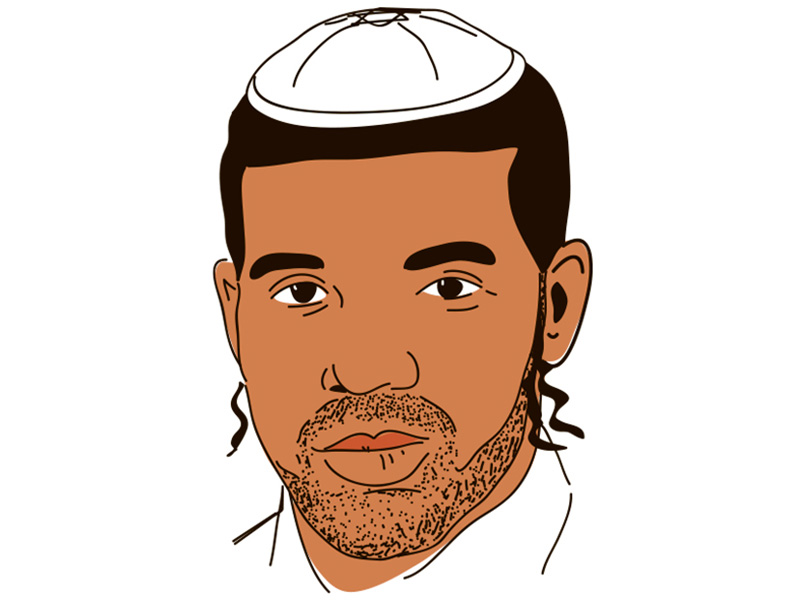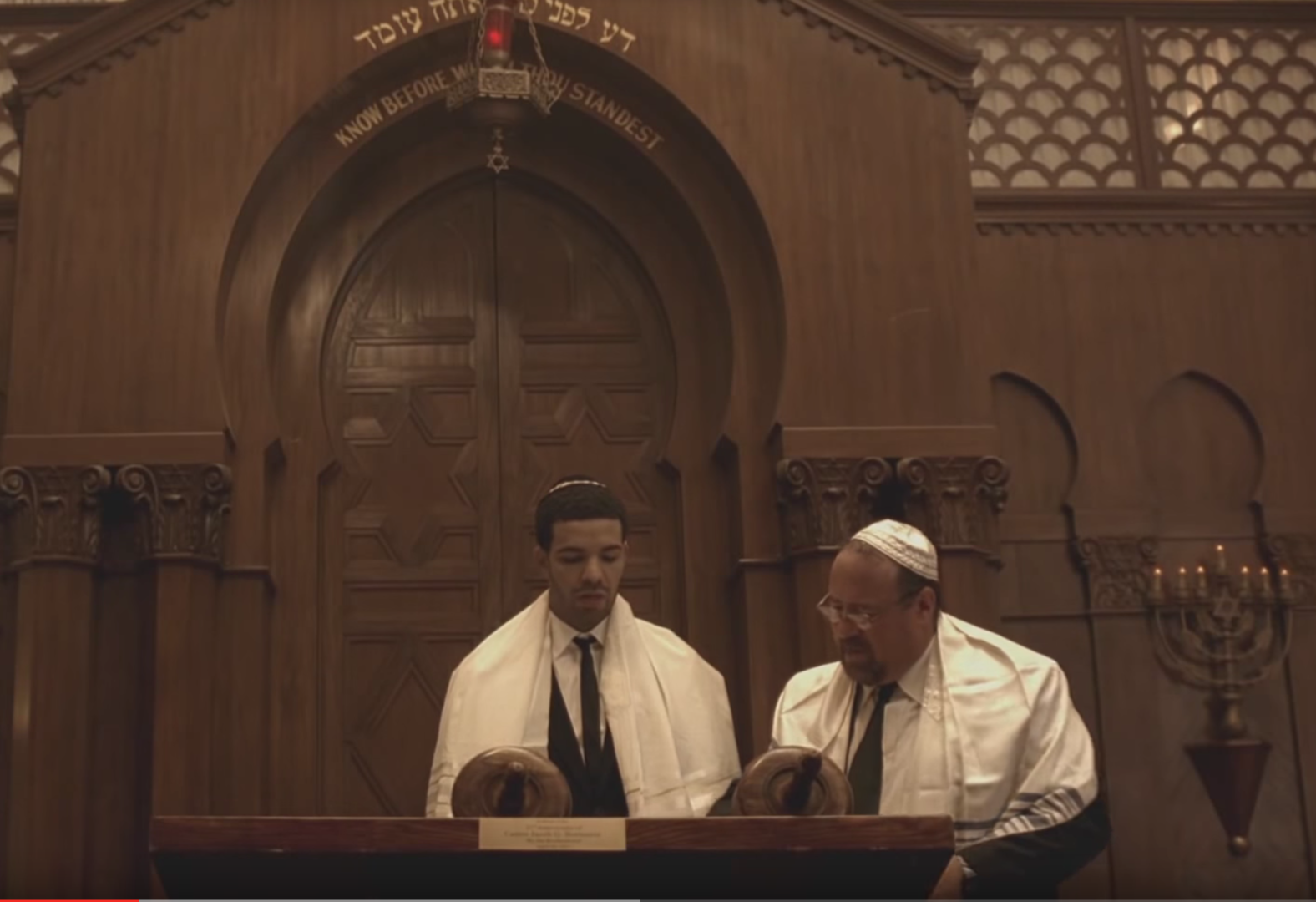When Jasmine Robinson was a preschooler, she had a choice to make. Her interfaith parents sent her to both Jewish and Christian extracurriculars – a Temple Tots program led by a staunch rabbi too old for the job, and a part-time Bible school.
“I remember thinking, ‘What’s so important about Jesus?’” she recalls. “That was when I was thinking, religiously, ‘Which path do I take?’ I just remember always feeling right being Jewish, feeling safe there.”
It was the less obvious choice. Robinson is black, and grew up in the predominantly Catholic south side of Long Island, N.Y. Despite her early spiritual decision, her family wasn’t religious, and she didn’t really grow up Jewish. When her parents asked her whether she wanted a bat mitzvah or a sweet 16, she chose the latter.
But her life was never comfortable. By the time she left home for university, she says, “I needed answers, and I just didn’t have any.” So she decided to explore her religion more seriously, quietly fasting for Yom Kippur and eating hamantashen on Purim. She soon transferred to a college with a Hillel community, basking in the relief of no longer being the only Jew for miles, and – during a life-changing year, at a moment when she needed to see it most – she watched Drake debut his latest music video, HYFR.
“It’s one of the first things that ever spoke to me,” she says. “I was like, ‘This is literally my life.’”
If you aren’t one of the 44 million people who have watched the video on YouTube, it casts Drake in a tallit and a kippah, bowing his head as he reads from the Torah, then cuts to him throwing a bombastically black “re-bar mitzvah,” the opening title proclaims, “as a re-commitment to the Jewish religion.” Young black women giggle on the laps of old frum men, and Drake sings “Hell yeah” while being lifted for the horah, smashing a Torah cake and hotboxing the synagogue.
The mainstream Jewish reaction was mixed: Is this a mockery of Judaism? Is he using it to seem cool? Is he making Judaism cool? But for Robinson, none of that mattered. Watching Drake on screen, owning both his Judaism and blackness with all smiles and pride, was nothing short of a game-changer.
READ: DRAKE’S PROFANITY-LACED ‘RE-BAR MITZVAH’ VIDEO STIRS CONTROVERSY
“I remember seeing this video and thinking, ‘Oh my God, you can do this as an adult?” she says. “This is something that definitely made me realize I don’t need to hide anymore, because I was doing that for a really long time. I was hiding who I was because I didn’t want to talk about it. I was just ashamed. And then Drake made a whole video about it.”
◊
It’s easy to say Drake is good for black Jews. As a public figure, he may be the most famous black Jew since Sammy Davis, Jr. (Lenny Kravitz is disqualified for having tattooed his back with the phrase “My heart belongs to Jesus Christ.”)
But is Drake good for Jews in general? To figure it out, it helps to look at his distinctly Canadian Jewish upbringing.
Drake was born Aubrey Graham on Oct. 24, 1986, in Toronto. His parents divorced when he was five, so he lived with his Jewish mother in the city – first on Weston Road, then in the Jewish neighbourhood of Forest Hill, renting the bottom two floors of a nice house. Drake’s room was in the basement, and he studied at Forest Hill Collegiate Institute, surrounded by generally better-off, white Jews.
The rapper has been open about not fitting in at Forest Hill. “The racism I experienced was being Jewish,” he told Vibe magazine in 2014. “Jewish kids didn’t understand how I could be black and Jewish, ’cause we’re all young. It was just stupid, annoying rich kids that were closed-minded and mean, so I dealt with that more than anything.”
Things changed on a day he once described to Jimmy Fallon on late-night TV. He had an audition for Degrassi: The Next Generation, “but it was also the day I finally got accepted by these really cool Jewish kids at my school.” They invited him to smoke marijuana – a first for him – so he agreeably went along and auditioned high for the popular teen drama, in which he would ultimately get cast.
‘Drake’s Judaism is just one facet of a carefully constructed fluid identity that balances his blackness, Canadianness and Jewishness’
After leaving the show four years later, Drake dived into music full-time, peppering lyrics with occasional but open references to his Judaism (“I was born to do it, born to make bomb music/ I flow tight like I was born Jewish/ Well, actually I was born Jewish”) and publicly speaking about his religion, albeit in vague terms.
His most candid – and most equivocal – interview on the subject was with English DJ Tim Westwood in 2011, where he revealed that he talks to God, but quickly clarified, “I’m not too much of a religious person. You know, I’m Jewish, so, uh… I don’t really…”
He then cracked a smile, not knowing exactly how to phrase whatever he was thinking. “Talking to God, in really Christian ways, is sort of, I guess, an odd thing to do. It’s more just a personal thing. It doesn’t matter about religion or – I just talk, man. I need someone to talk to.”
It’s the closest thing to an admission of agnosticism that he’s ever made, and it’s hard to say how flippant comments like that – arguably diminishing the connection between Jews and God – affects the public perception of Judaism. Read the YouTube comments on that interview and you’ll find one that says, “i am a Christian but, i know that God loves Jews because God said the children of Abraham will be more than the grain of sand, so i LOVE ALL JEWS (especially Drake).” Ignore that post’s devolution into a 33-comment thread hijacked by anti-Semites who claim the Bible “clearly explains modern jews are the synagogue of satan,” and you have some evidence that Drake might, in fact, be good for the Jews.
Fairly, you might be wondering why I’m citing random YouTube users with any credence at all. The reason is that startlingly few Jews and Drake fans care, or even know, that Drake is Jewish. I posted to fan clubs on Facebook and Reddit, asked music-industry and Jewish friends on social media, sent dozens of emails to young rabbis and Jewish leaders across Canada, and literally none of them had any opinion on the matter. To look at Drake’s reputation online – a galaxy of videos, comments, listens and analyses – you’ll quickly see how much he downplays his Judaism, especially compared to his other two claims to minority status: being black and being Canadian.
◊
One thing is certain: even if Drake isn’t good for the Jews, Drake’s Judaism is good for Drake.
No one has studied Drake as much as Amara Pope, the PhD student at Western University who spent a large part of her recent academic career analyzing pop-culture identity politics via the famous rapper. According to Pope, Drake’s Judaism is just one facet of a carefully constructed fluid identity that balances his blackness, Canadianness and Jewishness all at once.
“It’s a very strategic marketing tool,” she says. “I think he’s able to create a fluid identity by reflecting his audience’s experiences, because of his position, because he’s biracial, because he grew up in two different homes, two different communities. And so the ways in which he shows that, he’s representing the Canadian identity, too, because the Canadian identity is so fluid.”
She concedes he represents Judaism less than he does Toronto (he’s a brand ambassador for the Raptors) or his blackness (he is, remember, a hip-hop star). In 2013, he put out a video for his single Worst Behavior – deliberately using American spelling – shot on the downtrodden streets of Memphis, where his father was born, and surrounding himself with pink Cadillacs and shanty homes. It was yet another version of Drake that seems incompatible with his alter ego as the nice Jewish boy.
Yet Pope insists Drake is proud of his Judaism in more ways than just a marketing tool. For example, HYFR opens with vintage footage from his actual bar mitzvah in 1999, held in an Italian restaurant. “He didn’t have to situate it in a particular religion. I think it was purposeful to create visibility,” she says. “He is increasing the visibility of the Jewish community.”
When Pope first told me that, I was skeptical. Drake’s Judaism is a veneer at best, I reasoned. Jews don’t need visibility because everyone knows we exist, and the video was so far removed from reality that its viability as a mainstream educational tool, which viewers would realistically watch and wonder about the subtle inclusion of tzitzit and salted fish and their relevance to Jewish people, was beyond far-fetched.
‘To disregard Drake’s ability to affect Jews in general… is to disregard Jews who are growing up outside of liberal, multicultural cities’
But that was before I read a brief article by Jasmine Robinson on Rose Water, an online feminist magazine, titled “Impact, Thanks to Drake.” While Robinson mentions the rapper only once, I changed my mind after I contacted her directly and heard her story.
I realize now that to disregard Drake’s ability to affect Jews in general, as I and many others did, is to disregard Jews who are growing up outside of liberal, multicultural cities. That was my journalistic mistake – I reached out to as many young Jews as I could, sure, but the only ones I could find were as open and comfortable with their Judaism as I am. We don’t need rap stars to represent our religion. Jews like Robinson don’t share that privilege.
READ: SPEAK OUT AGAINST POLICE SHOOTINGS, BLACK JEWS URGE
If Drake’s existence alone, his sheer popularity, can make Judaism seem a little cooler, or make any young Jew prouder, then the answer is yes, Drake is good for the Jews, because at least it’s something.
In Robinson’s case, Drake’s influence went one step further. The re-bar mitzvah he threw himself in HYFR inspired her to throw her own. If Drake can do it, she figured, why can’t I? Six months before her 21st birthday, she flew to Israel on a Birthright trip and celebrated the bat mitzvah she’d turned down four years earlier, finally surrounded by the faith she never knew she needed but could now truly embrace.
“I just want people to keep their minds open to accept all Jewish people, because it’s lonely for us sometimes,” she says. “It’s definitely very lonely to always walk into a room and have no one look like you. So just being understanding of that, and knowing that there’s still stuff that can be done, and trying to undo your own biases – that’s my main thing. And if it starts with listening to more Drake, then listen to more Drake, I guess.”
Author

Michael is currently the director of The CJN's podcast network, which has accumulated more than 2 million downloads since its launch in May 2021. Since joining The CJN in 2018 as an editor, he has reported on Canadian Jewish art, pop culture, international travel and national politics. He lives in Niagara Falls, Ont., where he sits on the board of the Niagara Falls Public Library.
View all posts





